How to get a Perfect Score in RCs | 250 RCs for CAT Exam PDF Download
| Table of contents |

|
| Challenge 1: How Much to Read? |

|
| Challenge 2: What is the Topic? |

|
| Challenge 3: How Dense is the Topic? |

|
| Challenge 4: What Kind of Questions? |

|
| Exam Tips for RC Success |

|
| Key Takeaways |

|
This guide helps you master Reading Comprehension (RC) in the CAT exam. RC can be a great way to score high marks, but many students find it tough. We’ll break down the challenges and share strategies to improve your performance, pairing each challenge with its solution, followed by exam tips to boost your success.
Understanding RC Challenges
RC passages in CAT feel hard because of four main factors. Knowing these will help you prepare better.
Challenge 1: How Much to Read?
CAT RC passages are usually 400–600 words, averaging 500 words. If you know the topic well, you can read it in 3–4 minutes (about 125–165 words per minute). But if the topic is new, it might take 5–6 minutes because understanding is harder. Here's a breakdown of CAT and other MBA exams:
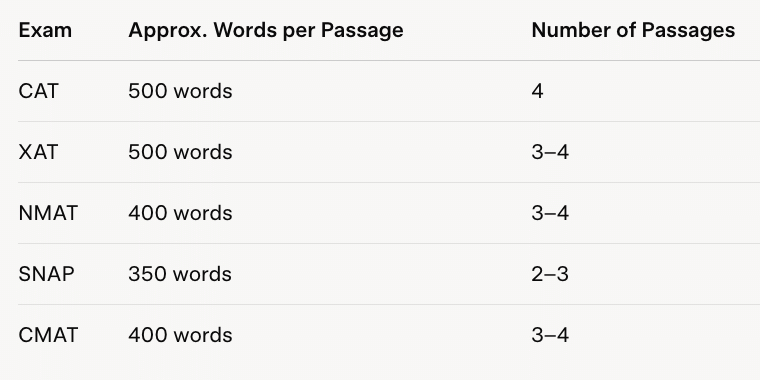
Why It Matters: The CAT VARC section has 24 questions in 40 minutes, with RC taking up 16 questions (4 passages, 4 questions each). You get 8–10 minutes per passage, including reading and answering. Spending too long reading leaves less time for questions.
Key Point: Understanding is more important than speed. If you rush and miss the main idea, you’ll struggle with questions.
Solution: Strategies for Reading Amount and Speed
Know the Topics: Read about different topics so you feel comfortable. If you’ve read about "Economics," terms like "GDP" won’t slow you down.
Read Actively: Look for the passage’s structure: start (context), middle (arguments), end (summary). In a 500-word passage, the first 100 words set the scene, the next 300 give details, and the last 100 wrap up.
Time Yourself: Practice reading a 500-word passage in 3.5 minutes. Use a timer and improve gradually. Apps like Spreeder can help.
Skim Smartly: Don’t focus on every word. In a "History" passage, skim dates (e.g., "476 CE") but understand the main point (e.g., fall of Rome).
Tough Passages: If a topic like "Chemical Sciences" feels hard, read the first and last paragraphs for the main idea, then skim the middle. Revisit for details later.
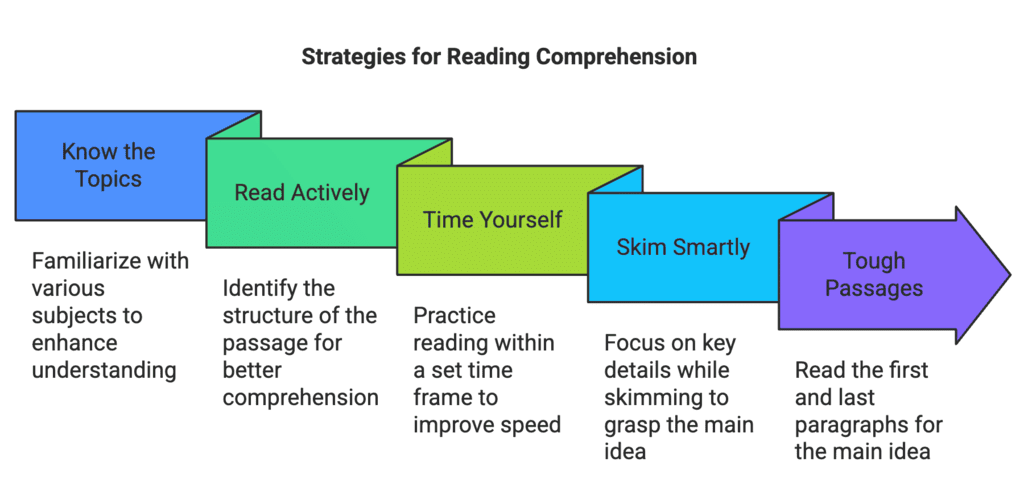
Challenge 2: What is the Topic?
CAT RC passages cover a wide range of topics from these areas:
History: Historical Theory, World History, Roman History, Medieval History, etc.
Example: A passage on "Roman History" might discuss the Roman Senate and ask about the author’s view on power.Philosophy: Philosophical Ethics, Metaphysics and Epistemology, Human Rights, etc.
Example: A passage on "Human Rights" might explore rights after World War II and ask what the author thinks about global rights.Literature: Medieval Literature, Renaissance Literature, Contemporary Fiction, etc.
Example: A passage on "Contemporary Fiction" might discuss dystopian novels and ask about the tone.Languages: Applied Modern Languages, Cultural Translation, Speech Analysis, etc.
Example: A passage on "Speech Analysis" might look at political speeches and ask about persuasive language.Religious Studies: Interreligious Studies, Sacred Texts, Foundations of Worship, etc.
Example: A passage on "Interreligious Studies" might compare Buddhism and Christianity and ask about the author’s view on faith talks.
Social Sciences:
Anthropology: Social Thought, Writing Cultures, Social and Cultural Theory, etc.
Example: A passage on "Social and Cultural Theory" might discuss globalisation’s effect on local cultures and ask about the main point.Economics: Statistics, Microeconomics, Macroeconomics, Economic Methods, etc.
Example: A passage on "Macroeconomics" might cover inflation and ask, "What caused inflation in 2020?"Political Science: Comparative Politics, Political Theory, Conflict and Power, etc.
Example: A passage on "Conflict and Power" might explore dictators and ask what the author thinks about power.Psychology: Personalities Theory, Cognitive Psychology, Psychology Ethics, etc.
Example: A passage on "Cognitive Psychology" might discuss memory and ask about study results.Sociology: Quantitative and Qualitative Methods, Social Research Strategies, etc.
Example: A passage on "Social Research Strategies" might discuss surveys and ask about their limits.
Natural Sciences:
Mathematics, Computer & Information Sciences, Physical Sciences, Chemical Sciences, Earth Sciences, Biological Sciences, etc.
Example: A passage on "Earth Sciences" might cover climate change and ask what the author thinks about carbon emissions.
Why It Matters: Familiar topics are easier to read and understand, helping you answer questions faster and better.
Solution: Strategies for Unfamiliar Topics
Read Daily: Check out The Hindu (Economics, Sociology), Aeon (Philosophy, Psychology), and Scientific American (Natural Sciences). They have articles like CAT passages.
Example: Read Aeon pieces on "Philosophical Ethics" to understand ideas like right and wrong.Mix It Up: Spend time on each area weekly:
Monday: Humanities (e.g., a Guardian article on "Renaissance Literature").
Tuesday: Social Sciences (e.g., an Economic Times piece on "Macroeconomics").
Wednesday: Natural Sciences (e.g., a National Geographic article on "Earth Sciences").
Use Past Papers: Look at RC passages from the last 5 years to spot common topics. For example, CAT 2023 had passages on "Social Thought" and "Biological Sciences."
Discuss with Friends: Talk about topics like "Human Rights" or "Conflict and Power" with peers. Explaining helps you learn.
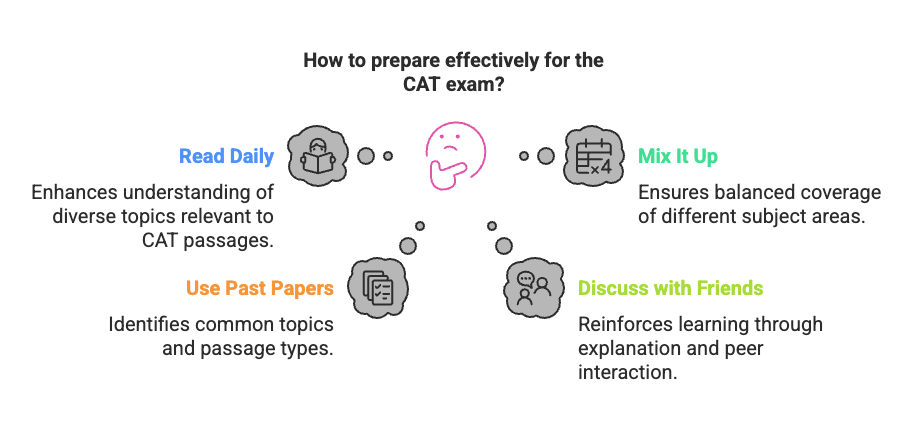
Challenge 3: How Dense is the Topic?
Density means how hard the passage is to read, based on two things:
Long Sentences: How many words in a sentence? A 30-word sentence is harder than a 10-word one.
Long Words: How many syllables in a word? "Epistemology" (5 syllables: e-pis-te-mol-o-gy) is tougher than "Book" (1 syllable).
Examples:
Dense Passage: A "Philosophy" passage might say, "The epistemological framework of understanding reality often conflicts with metaphysical assertions about existence." This is hard—long sentence (14 words) and big word "epistemological" (6 syllables).
Less Dense Passage: A "Literature" passage might say, "Modern novels often show a dark future." This is easier—short sentence (7 words) and simple word "modern" (2 syllables).
Why It Matters: Dense passages take more time to understand and can confuse you if the topic is new, making questions harder to answer.
Solution: Strategies for Dense Passages
Break It Down: Read one sentence at a time. In a dense "Philosophy" passage, focus on understanding each idea before moving to the next.
Look for Keywords: In a tough sentence, find the main words. For example, in "The epistemological framework of understanding reality…," the key idea is "understanding reality."
Don’t Panic: If a passage feels too hard, skim for the main idea (first and last paragraphs) and move to the questions. Come back for details.
Practice with Dense Topics: Read articles on tough topics like "Chemical Sciences" or "Political Theory." The more you practice, the easier it gets.
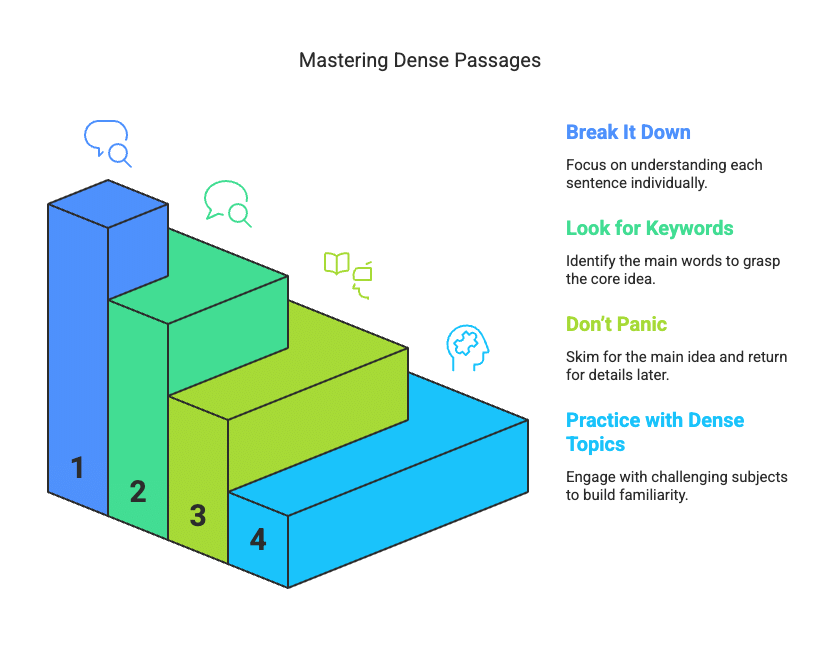
Challenge 4: What Kind of Questions?
CAT RC questions come in three types:
Main Idea Questions: These ask about the big picture—what’s the passage about? They might also ask about the author’s tone or purpose.
Example: "What is the author’s main point about cultural evolution?" (Anthropology topic).
Why It Matters: Tests if you get the passage’s core idea.Fact-Based Questions: These ask for specific details straight from the passage.
Example: "What caused the economic downturn in the 2000s, according to the passage?" (Economics topic).
Why It Matters: Checks if you can find details quickly.Inference Questions: These ask you to think deeper and figure out what the author means without saying it directly.
Example: "What can be inferred about the impact of interreligious dialogue?" (Religious Studies topic).
Why It Matters: Tests deeper thinking, often worth more marks.
Solution: Strategies for Different Question Types
Main Idea Questions: After reading, ask yourself, "What’s the passage mostly about?" Write it in one sentence. Look at the first and last paragraphs. For example, a "Psychology" passage might be about "how memory works."
Fact-Based Questions: Practice scanning for numbers, dates, or names. In a "History" passage, look for years like "1945" to find answers fast.
Inference Questions: Think about the author’s feelings. If a "Literature" passage says, "Dystopian novels warn us," the author might feel worried about the future—that’s an inference.
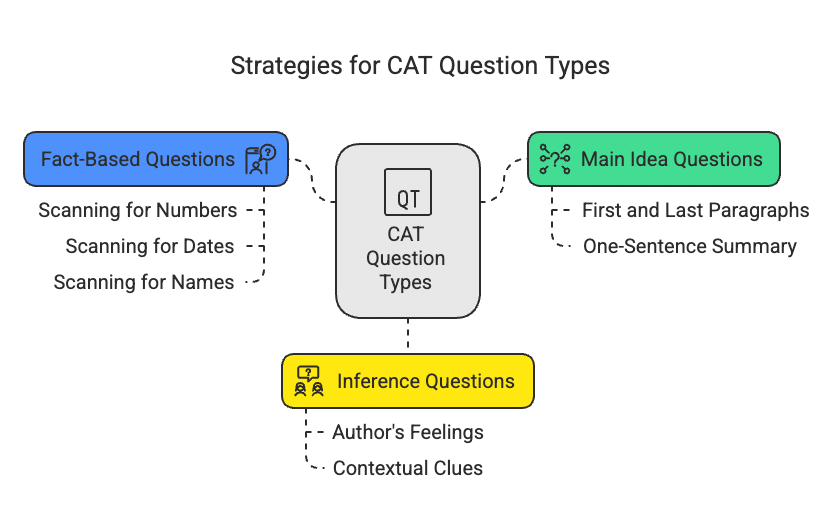
Exam Tips for RC Success
These tips will help you perform better on the CAT exam day:
Pick the Right Passage First: Skim the topics and start with the one you know best. For example, if you’re good at "Literature" but not "Economics," do the Literature passage first to save time and build confidence.
Avoid Common Mistakes: Don’t overthink inference questions—stick to what the passage hints at, not your own ideas. Also, don’t spend too long on one passage (max 10 minutes). Move on if stuck.
Use Elimination for Tricky Questions: CAT RC questions are multiple-choice. If unsure, cross out wrong options. For example, if an option contradicts the passage, remove it.
Learn from Mocks: After each mock test, check which topics or question types you got wrong. If you struggle with "Inference" questions on "Philosophy" passages, practice more of those.
Key Takeaways
CAT RC tests understanding and logic, not just English. By knowing the challenges and using exam strategies, you can turn RCs into a scoring section. To master RC during preparation, follow these practice tips and exercises:
Practice Tips for RC Mastery
Solve RCs Daily: Practice RCs on different topics using past CAT papers or previous tests to improve adaptability.
Take Pauses: While reading, pause after each paragraph to let the content sink in. The goal is to understand, not to rush.
Keep a Topic Journal: After reading an article on a CAT topic (e.g., "Social Research Strategies"), write a 50-word summary of the main idea. This helps with main idea questions.
Practice Dense Passages: Pick one dense passage a day (e.g., on "Earth Sciences"). Underline long sentences and big words, then simplify them in your mind.
Label Questions: When practising, do one passage a day and label each question (Main Idea, Fact, or Inference). This helps you get used to all types.
|
15 videos|257 docs|10 tests
|
FAQs on How to get a Perfect Score in RCs - 250 RCs for CAT Exam
| 1. How can I improve my reading speed for the CAT exam? |  |
| 2. What types of passages can I expect in the CAT reading comprehension section? |  |
| 3. How should I manage my time while reading comprehension passages in the CAT? |  |
| 4. What strategies can I use to tackle difficult passages in the CAT Reading Comprehension? |  |
| 5. Are there any common traps to avoid in CAT reading comprehension questions? |  |




















